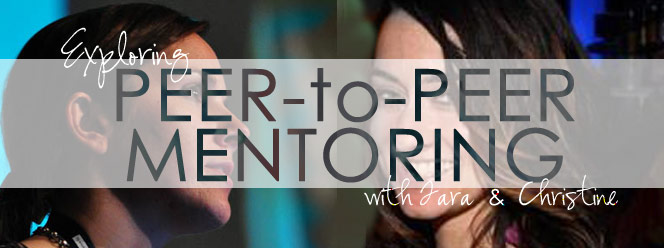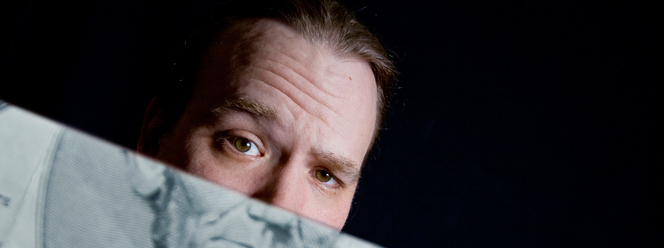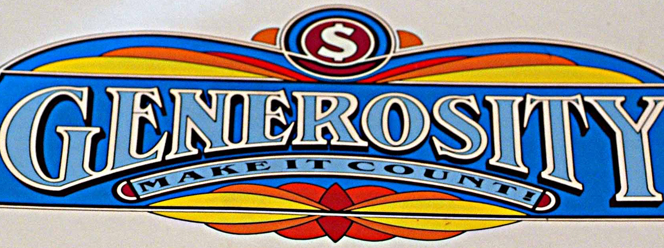
by Tara Joyce | Feb 29, 2012 | My Journey | What's On My Mind

This is the sixth installment of Christine and my Peer-to-Peer Mentoring series.
On her blog, I answered her question:
“As a consultant I’m always creating fun methods for my clients to reach their target markets. I think I have a knack for anticipating needs and have been able to develop and design tangible solutions to connect my clients’ philosophies, products and services to their desired consumers. I’m considering courting a company in Los Angeles to hire me as a patchworker (coined by Dr. Kristin Cardinale) to fulfill several areas they’re looking to enhance. I’d like to create a proposal that presents the idea: instead of hiring two separate people for two separate positions, that they hire me as a consultant to fill and bridge the gap between the two positions. Currently they’re listing two positions traditionally. I’d like to create a mind-blowing presentation that convinces them that my experience as a business developer, owner, health care specialist in private practice and journalist will offer them far more versatility than hiring two separate people could… I’ve already considered your advice from last month about preparing an interactive CV/resume, but what else can you suggest for this specific task? I’m open to any tools you might have in mind”
My Question to My Mentor:
“My big focus of 2012 is to shift the adversarial relationship I have with writing. I want to ease the conflict within myself — I completely resist doing ‘it’, despite the deep love I feel when I actually do ‘it’. To give myself a chance of outsmarting my resistance, my solution is to further develop and entrench my writing practice/method in my daily life. It would be inspiring to me to learn of your current writing method/practice. Can you share it? What did you need to work through to get it to where it is now? And, how do you desire for your practice to evolve?”
Christine’s Answer:
I can relate to your “dilemma” that other tasks might need to take the place of writing or take precedence over it, yet once I immerse myself into the process I literally don’t want to stop either! Sometimes we convince ourselves that other things are more important. And this convincing, this hierarchy of importance we assign to tasks is likely ten percent substantiated by survival needs along with our integrity to fulfill needs of clients.
Finances: Beliefs & Behaviors
A thought to consider that many of us have had to at one time or another- how finances influence our decision making. Many of us believe that the work we’re getting paid for- at least the work we’re performing in the moment, week or upcoming month is more important than the un-known potential reward (financial or otherwise) of self-developed projects such as writing! If this is the case, ask yourself, if a publisher paid me an advance on my book would that inspire me to re-prioritize my schedule to fit writing in as much as possible? It’s a really fair question to ask ourselves to set the perspective for self-reflecting on finances.
If our behaviors are manifestations of our belief systems, it’s only fair to look at how the “anatomy” of our beliefs* surrounding money shapes and influences our decisions.
But hey, perhaps you’re independently wealthy and finances aren’t a concern at all! You asked what I had to work through- that was part of the process for me for a long time. I dissected the anatomy of my beliefs surrounding finances and discovered that I had the power to develop my own reward system.
I asked myself two simple questions:
- What happens when I write more?
- What happens when I write less?
Funny enough, I discovered that not only did “I’m happier in general” hit the top of the list of … when I write more, but so did, “my finances are improved” – there was a positive direct correlation between output of writing to in-flow of finances.
If you read my bio it literally says, “I’ve dedicated my career to the science of happiness” – I’m big on emotional gratification! Understanding how happy, relaxed and enriched I was during the times I was writing more was enough evidence for me that it was necessary to make it a priority in the hierarchy.
All throughout the week I engage in different types of journaling activities. Each of these is a little bit different, yet all mutually accentuate one another in some way. While the day of the week tends to be different based on my schedule, I’m always sure to allocate one or two “big” writing days to bring all of these writing experiences together. I use some for my blog, some for interviews I’m preparing for and the majority for my book projects. By constantly being engaged in the writing process, theoretically I’m always in the flow… so I have little trouble “making” myself do it. And, as I mentioned, the more I write, the happier I am, so this positive “side affect” makes it completely worth the devotion.
Here’s my system for keeping myself in the writing flow.
- Embracing on-the-go spontaneity. Being the natural social observer that I am, I keep a little journal to jot down notes on the go and get snap-happy with my camera as I’m tooling around town. I also like to use the notes app on my iphone- type up a note, email it to myself and presto, it’s in my database to add into greater bodies of work at any time. Sometimes I come up with title ideas, other times concepts and always strings that tie ideas together as I generate more and more throughout the week.
- End of week reflection. At the “end” of each week I either voice record or jot down a journal entry to reflect about my week. I include what I’ve observed, learned, read, overheard, talked about.. from there I infer how all of this relates socio-culturally. Because my greater work involves how people evolve through health, lifestyle, mindfulness and self-realization, I find this reflective time creates a rejuvenated sense for all I do. I can see that what I’m creating has purpose personally and professionally.
- Meditate intentionally and the words will follow. I do a lot of self-guided meditation to enhance awareness in all areas of my life, personal and professional. I know that self-cultivation leads to my ability to share ideas and help others grow which is the intention of my writing.
- Once a week “field-trip” writing. At least once a week I get out of the house, head down to one of my favorite coffee shops or the beach and write away. I try to bring together all of the pieces I’ve been working on throughout the week. This is where I blend the ideas I generate during my self-reflection time. I also look at the photos I’ve taken and mini-journals I jotted down while I was about and about during the week. This synthesis of the smaller pieces is a fun motivating force!
Maybe at this point you’re thinking, “hey, great ideas, but still, how do I make myself do it?” Try this meditation if so…
Refer to number two for the end of the week reflection. I said, “I can see that what I’m creating has purpose personally and professionally.” Get yourself a really good visual that represents the purpose of your creations. See it, feel it, believe it, live it. Repeat. Try it, it works!
How do I desire for my practice to evolve you ask? I want to become a better copy editor! I read your writing and it inspires me to create beautiful copy!

by Tara Joyce | Feb 16, 2012 | Pay What It's Worth Pricing

Here are some basic findings on using a Pay-What-It’s-Worth pricing system from the research paper Pay What You Like by J Fernandez and B Nahata:
1.
If a buyer feels that a product or service provides a positive value, they will never ‘free ride’ and not pay anything.
2.
Under certain conditions Pay-What-It’s-Worth can provide a larger profit than uniform pricing. A business that can best benefit from PWIW is:
- small
- exclusive
- intimate
- focused on personal service
- creating loyal clientele
3.
People pay what they do because of their:
- fairness
- satisfaction
- market price awareness
- net income
4.
The pricing system is used by business owners throughout the world.

by Tara Joyce | Feb 7, 2012 | Pay What It's Worth Pricing
 I like to think about money as an idea in the form of ‘credit’. To get in the money game, I need to build up my ‘credit’.
I like to think about money as an idea in the form of ‘credit’. To get in the money game, I need to build up my ‘credit’.
I build ‘credit’ with others, but more importantly, I build ‘credit’ with myself. I receive ‘credit’ for how I hold myself up mentally.
When I hold myself as limited in any way, it restricts my availability to ‘credit’. I end up not sharing my gifts, and being undervalued in my relationships.
When I practice confidence in my Self, and not put limits on my wealth, I free the ‘credit’ to flow.
As I see it, to win in this game of money, my best move is to practice being the truest me.

by Tara Joyce | Jan 25, 2012 | Pay What It's Worth Pricing

Months ago, my dear friend Adam King and I sat down to talk. We’ve been having these skype talks for years now, sharing candidly with each other our expansion in life and business.
The last time we sat down to chat however, Adam had an agenda. He wanted to interview me and talk more in-depth about Pay-What-It’s-Worth (Value) pricing for a project of his. It’s a topic that we have explored together many times over the years and I was excited for the conversation.
Adam has recently published a book called The Year of Zen, through which he shares his learnings and expansion, online and off, over 2011. As a companion to the book, he created an interview series with 6 people he felt supported him in this journey. Our chat, Pricing From Personal Conviction, is part of this series.
You can watch it here.
I feel honoured that though my work, and our friendship, I have touched and inspired Adam.
I have always appreciated how Adam sees me, and my work. Here’s a taste of his perspective:
What’s your biggest hangup when it comes to pricing?
Well, Tara Joyce is about to challenge that petty fear and turn it on it’s head.
Tara is at the forefront of new pricing. Besides being a consultant, designer, and writer, she’s also a successful practitioner of “Value Pricing” and leading the rise of the Innerpreneur – a conscious choice for doing business from the inside out. . . .
I welcome you to explore Pay-What-It’s-Worth pricing with us. I think you will appreciate Adam’s knack for staying light while digging deep.

by Tara Joyce | Jan 23, 2012 | My Journey | What's On My Mind

This is the fifth installment of Christine and my Peer-to-Peer Mentoring series. On her blog, I answered her question:
“Currently I keep an updated CV on file. While I’m proud of my profile and professional history, I’d like to put together a jazzed up version. I’m thinking of doing a website resume- what are your thoughts on the effectiveness of this plan and how would you proceed creatively?”
My Question to My Mentor:
“While I love how focused I am on my work, I often find that my focus is so focused that I forget to eat. I am healthy and well-nourished despite this tendency but I would like to change it. I think it’s important that even when I am “in the flow”, I am still mindful of my bodily needs. Do you have any thoughts on how I can improve this situation and become better at checking-in with my body?”
Christine’s Answer:
Let’s look at all of the key words you used to describe your goals-remembering to eat by becoming better at checking in with yourself. Remember, forget, important, “in the flow” mindful, healthy, well-nourished, checking in… all the ingredients of a belief system. How we believe we’re doing is a direct reflection of how we are doing and behaving.
Grab those key words and use them to ask yourself the question, “do I believe that remembering to eat is one of the most important, mindful activities I can do to become well-nourished?” If the answer looks something like, “I believe that eating is one of the most important activities to stay well-nourished and “in the flow”- I can make this happen by becoming more mindful of the healthy behaviors that help create my success everyday” then you’ve just set yourself up to make it happen.
Understanding how our beliefs are attached to the behaviors we perform and participate in everyday will help us learn a great depth about ourselves!
Behaving Is Believing
A handful of people died this summer from melon fruit contaminated with listeria bacteria and countless cases of people are treated everyday for illnesses from bacterias and “germs” that are food-borne. Despite this fact, many people still skip washing their produce before eating it or store it in containers or bags that may contain bacteria. You’d think because the research reveals facts citing deaths and serious illness from exposure that people might change their behaviors right? Wrong. Turns out after careful inspection, the ingredients that make up our beliefs are what really drive our everyday behaviors. You may be well-aware that by not calling a bill collector your interest rates are increasing or your credit rating is potentially being damaged, yet even still “knowing” these very likely unfavorable consequences that will result from you continuing to ignore the issue, you do so. Why do we do these things in life despite our knowledge of the facts or agreed upon socially-accepted norms? Fear, denial, behavior modeling a parent from childhood and ordering of survival priorities all affect how we perform everyday- because those things are what shape our beliefs.
Despite the commonly known facts, we believe that the bacteria won’t kill us because our mothers never washed our fruit and we didn’t die, we can continue to ignore the bill collector because our fear is allowing us to deny that the likely consequences aren’t that big of a deal or that if we only eat once and a while that we will still be nourished because other things are more important. See how much our beliefs influence our behaviors!
So how do we change our behaviors is they’re attached to our beliefs? Looking at how we behave by examining the key words we use to describe our everyday activities is a powerful way to create and enact the change we’re hoping to achieve. This is easier than you think, it just requires full honesty with ourselves. Depending on what the behavior is, perhaps we’ve been performing or operating under a belief about it since childhood. Since our beliefs are largely shaped by how we’re raised, sometimes we have to pluck the source from “way back then.” Remember though, this is a safe and empowering activity-you’re disclosing, exploring and revealing information about yourself, but to yourself- nobody else has to know!
Free Your Mind And The Rest Will Follow
Not only a catchy pop song of the 90’s, an invaluable truth about the human psyche. Sometimes we can make things so hard on ourselves. When one thing goes wrong, or a cycle has been circling over a long period of time, we blame ourselves for failure instead of looking at the progress we’ve actually achieved. By examining and re-configuring those key words we use to describe our selves, motivations and fears, we can begin enacting new behaviors that will allow us to reach our goals because we believe our goals are important and necessary for our self-satisfying survival. Most of us are already doing a great job reaching our goals, generally with only a little to tweak here and there.
Make It Happen
Write down the goal and examine the key words. Now re-configure the key words into a power phrase or two like the one above (related to why eating will become important). Those power words help you understand why your goals are important- so much so that you will begin to believe that by performing them and establishing regular behaviors you will be “better” for it.
Your brain is your most powerful asset when we’re talking beliefs. Get it to believe a behavior is important and you’ll be performing and operating in ways that shape your life in the fashion you’ve always wanted! Need an easy way to teach your brain? When working toward a goal and you feel yourself “slipping” away from a positive outlook, remind yourself of the 99 things you are already doing “right” instead of the one thing you may still be working through or learning about. Those 99 things you’re doing “right” will tell your brain to believe that your goal is important enough to keep striving toward.
I could have made you a list of suggestions that read something like:
- place fruit bowls on the counter
- put a protein bar next to your computer
- set an alarm that signals getting up from your table to eat
I do consider those all great suggestions to establish your goals, but until you/we understand how our goals and behaviors are related to our beliefs that list would have been just that, a static, one-dimensional list of “tasks” that you now “must” perform. Once you go back to explore what being “in the flow” really produces for you and your health, you’ll naturally find those new activities in the stream because you conscious mind believes the flow couldn’t exist without them.





 I like to think about money as an idea in the form of ‘credit’. To get in the money game, I need to build up my ‘credit’.
I like to think about money as an idea in the form of ‘credit’. To get in the money game, I need to build up my ‘credit’.

